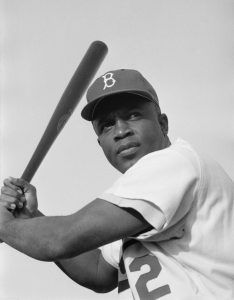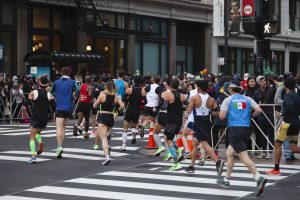In 1974, James Harris became the first black quarterback to start an NFL game. He was called upon to replace John Hadl and inject a spark into a struggling 3-2 Los Angeles Rams team. Harris delivered, throwing for 276 yards and 3 touchdowns, rushing for another touchdown and completing 80 percent of his passes, leading the Rams to a 37-14 victory.

Harris would go on to compile a record of 21-6 as a starter while taking the Rams to two NFC title games, winning a Pro Bowl MVP award and getting the nod from his teammates to be captain. Regardless of all he had done, Harris was rather abruptly replaced. He watched as the Rams brought in four white quarterbacks to replace him and then shipped him off to San Diego at the first sign of struggle.
Fast forward 40 years later and black quarterbacks are taking the NFL by storm. On opening day of the 2013-14 NFL season, nine black quarterbacks started, an NFL record.
“The NFL is a reflection of the college game in many ways,” said Ray Fittipaldo, Sports Reporter for the Pittsburgh Post-Gazette. “More colleges are employing spread offenses and more black quarterbacks are running them. NFL teams are more open to having quarterbacks who can not only pass, but run.”
It’s strange to think that just a few years ago, several dual-threat black quarterbacks, such as Brad Smith out of Missouri, were converted to other positions coming out of college and coveted only for their speed. Joe Webb of the Vikings and Denard Robinson of the Jaguars are the most recent examples.
So seeing nine black quarterbacks take the field on opening day is undoubtedly a sign of progress right? It’s an opportunity for black quarterbacks to shine, isn’t it?
Deadspin Staff Writer Greg Howard has a different take on things:
“It’s definitely a step in the right direction for black quarterbacks,” Howard said. “But it’s also a step backwards. A few years ago, you had to be nearly perfect to be a black quarterback in the NFL. Guys like Warren Moon, Doug Williams, [Donovan] McNabb and even Michael Vick all had to be at the top of their game. Now guys can be just average, even mediocre and start games in the NFL.”
Despite seeming a bit harsh, Howard does have a point. The nine black quarterbacks compiled a record of 4-5 on opening day, not overly impressive. Their passing stats however, were a different story, as the nine QBs combined for 2,222 yards, 14 TDs and 6 INTs, while completing 64.3 percent of their passes. With numbers like that, it won’t be long before teams start to give more black quarterbacks an opportunity.

Daniel Jeremiah, an NFL Network analyst, seems to think so. In an interview with the website, The Big Lead, Jeremiah said it’s not unrealistic to think that by Week 1 of the 2015 season, half of the NFL’s starting quarterbacks could be black.
“Absolutely that could happen,” Jeremiah told the site. So many African-American quarterbacks are now being allowed to throw the ball in college, and they’re being successful. There’s another whole wave of talented kids coming.”
While half (16) may seem like a bit of a reach currently, with Teddy Bridgewater being the only top 10 QB prospect in this year’s draft who is black, next year is a different story for black quarterbacks. Nick Marshall of Auburn, Heisman Trophy Winner Jameis Winston of Florida State and Braxton Miller of Ohio State are widely considered to be the top 3 prospects at the quarterback position in college football currently.
This meteoric rise of black quarterbacks is no accident, though. As CBS 2 Chicago Sports Anchor Ryan Baker points out, that’s where the game is headed:
“The word often associated with a black quarterback is athletic,” Baker said. “Lineman and linebackers are faster and more athletic now, so that’s where the game is going.”
Freakishly athletic defensive ends tasked with rushing the quarterback, similar to South Carolina’s Jadeveon Clowney, who was the No.1 pick in the 2014 NFL Draft, are on the rise. To counter athletes such as Clowney, NFL offenses have an increased need for dual-threat quarterbacks, and black quarterbacks seem to fit that bill. In fact, if you were to stop and think about every black quarterback starting in the NFL, you might notice that every single one of them is a dual-threat quarterback. It would almost seem that black quarterbacks can’t get a job unless they can run.
“Obviously we haven’t seen [pocket passers] by and large with the black quarterback,” Baker said. “Most black kids coming up in an urban area, what steers them towards football is their athleticism and that’s a trend that’s going to keep going. More players want to be like Cam Newton. They want to be able to run and have a strong arm.”

Mobility and a strong arm have become a deadly combo in the NFL. It’s that kind of skill set that led Russell Wilson to an MVP-caliber season and his first Super Bowl ring. Wilson is the second black quarterback to achieve this feat – Doug Williams was the first in 1988.
What’s perhaps an even bigger victory for Wilson than the Super Bowl itself is that no one really mentioned the fact that Wilson was black. Instead, Wilson was just looked at as a quarterback.
“When I was young it was a big deal that Doug Williams won a Super Bowl and broke ground like that,” Baker said. “A black quarterback wasn’t commonplace. It’s something we didn’t see.”
Gone is the hatred and ignorance that derailed the promising career of James Harris. He paved the way and now black quarterbacks have risen from underdog to top dog and proven their place alongside the likes of Tom Brady, Peyton Manning and Drew Brees. As they continue to win Super Bowls, put up Hall-of-Fame numbers and electrify fans, maybe we can do away with calling them black quarterbacks once and for all. Maybe we already have:
“When you’ve had QBs like [Kordell] Stewart, McNabb and the late [Steve] McNair, who’ve had the kind of success they’ve had, they aren’t being looked at as black quarterbacks anymore,” Baker said. “They are just quarterbacks now.”
Here’s to hoping it stays that way.










Be First to Comment